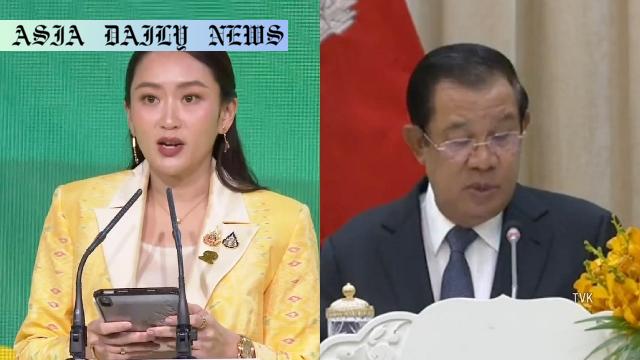Thailand Politics: Thai PM faces criticism after leaked call with Hun Sen prompts coalition friction, risking government instability.
Thailand’s PM faces backlash after a leaked call with Cambodia’s Hun Sen.
The coalition loses its second-largest ally, the Bhumjaithai Party.
Criticism grows amid border tensions and economic concerns.

Political Crisis Rocking Paetongtarn Shinawatra’s Government
Thailand’s political landscape has plunged into unrest following the recent fallout surrounding Prime Minister Paetongtarn Shinawatra. A leaked phone call between Paetongtarn and Cambodia’s Senate President Hun Sen not only triggered widespread criticism within Thailand but also forced the coalition to grapple with losing the support of its second-largest party, the Bhumjaithai Party. The controversial call revealed Paetongtarn referring to Hun Sen as “uncle” and making dismissive comments about others, which raised eyebrows both politically and diplomatically.
Her subsequent apology described her remarks as a “negotiation tactic,” but it appears to have done little to assuage public and political outrage. In the wake of the revelation, Bhumjaithai’s departure has left the ruling coalition with a fragile majority in parliament, threatening the stability of Paetongtarn’s government just months after assuming office. This development marks a rocky start for the prime minister, who has significant political legacy as the daughter of former Thai Prime Minister Thaksin Shinawatra.
Heightened Criticism Over Governance and Policy
Paetongtarn’s administration has faced mounting scrutiny over its handling of a recent border conflict with Cambodia. The clashes, described as one of the deadliest between the two neighbors in recent years, left citizens questioning the government’s competence in addressing international tensions. The leaked call has only exacerbated these concerns, with critics accusing the government of undermining both Thailand’s sovereignty and the credibility of its armed forces. The opposition parties, as well as the departing coalition member Bhumjaithai Party, have seized the opportunity to build momentum for their criticisms.
These challenges come amid widespread dissatisfaction over the country’s fragile economic recovery in the post-pandemic landscape. High inflation rates, stagnant wages, and unemployment issues have repeatedly been cited as major areas of public discontent. With the political elite distracted by infighting and scandal, substantive policy solutions appear distant, leaving ordinary Thais with waning confidence in their leadership.
The Broader Implications for Thai Politics
Paetongtarn’s flirtation with controversy resurrects echoes of Thailand’s tumultuous political history, a nation often known for its volatile shifts in power. Her family namesake inevitably draws comparisons to her father Thaksin Shinawatra, who remains a polarizing figure within Thailand. Critics argue that the current government still operates in the shadow of his controversial legacy, leaving it ill-suited to adapt to new and evolving crises.
With the coalition’s majority now alarmingly slim, analysts predict the possibility of either governmental gridlock or early elections. Such scenarios could potentially throw Thailand’s economic recovery into further disarray while prolonging instability at a time the nation needs decisive leadership. Moreover, the deterioration of relationships with Cambodia risks damaging long-standing trade and diplomatic agreements, compounding the challenges ahead.
Navigating the Fragile Future
As Prime Minister Paetongtarn navigates these uncharted waters, the pressure is not only to retain control of her coalition but also to restore credibility among both her allies and critics. Observers recommend holistic efforts to mend fences regionally and domestically. Even within these efforts, her administration will face an uphill battle balancing populist expectations with the pragmatic challenges of governance.
The coming weeks will prove pivotal in determining whether her government can rebound from its current state of disarray or whether deeper fractures will push Thailand toward yet another period of sustained political turbulence. At this crucial juncture, both the failures and successes of Thailand’s leadership will inevitably leave a mark on its evolving democracy.



Commentary
A Pivotal Moment in Thailand’s Political Landscape
The unfolding political crisis in Thailand serves as a sobering reminder of the precarious nature of modern governance, particularly in a nation that has historically oscillated between periods of democratic rule and authoritarian control. Prime Minister Paetongtarn Shinawatra, while undoubtedly inheriting a wealth of political knowledge and influence, seems to find herself navigating an increasingly treacherous landscape fraught with both internal and external challenges. The leaked conversation with Cambodia’s Hun Sen has amplified these difficulties, casting a shadow of doubt over her judgment and leadership approach.
Challenging Leadership in a Complex Climate
From an analytical standpoint, it is difficult to ignore the compounded pressures that Paetongtarn faces. On one hand, there is the immediate fallout from the leaked call, which has understandably sparked outrage regarding national sovereignty and military dignity. However, beyond this lies the deeper issue of an administration struggling to effectively address the concerns of its citizens. Economic struggles in particular continue to gnaw away at public trust, leaving the nation at a crossroads between stability and further fragmentation.
The Long-Term Repercussions of Fractured Alliances
The departure of the Bhumjaithai Party is perhaps the most tangible indicator of the government’s fragility. Coalition politics, by their very nature, demand an intricate balance of compromise and consensus, both of which appear to be eroding under the weight of recent scandals. Unless swift and decisive actions are taken to rebuild these alliances, it is highly likely that this event will merely serve as a prelude to more serious political fallout on Thailand’s horizon.